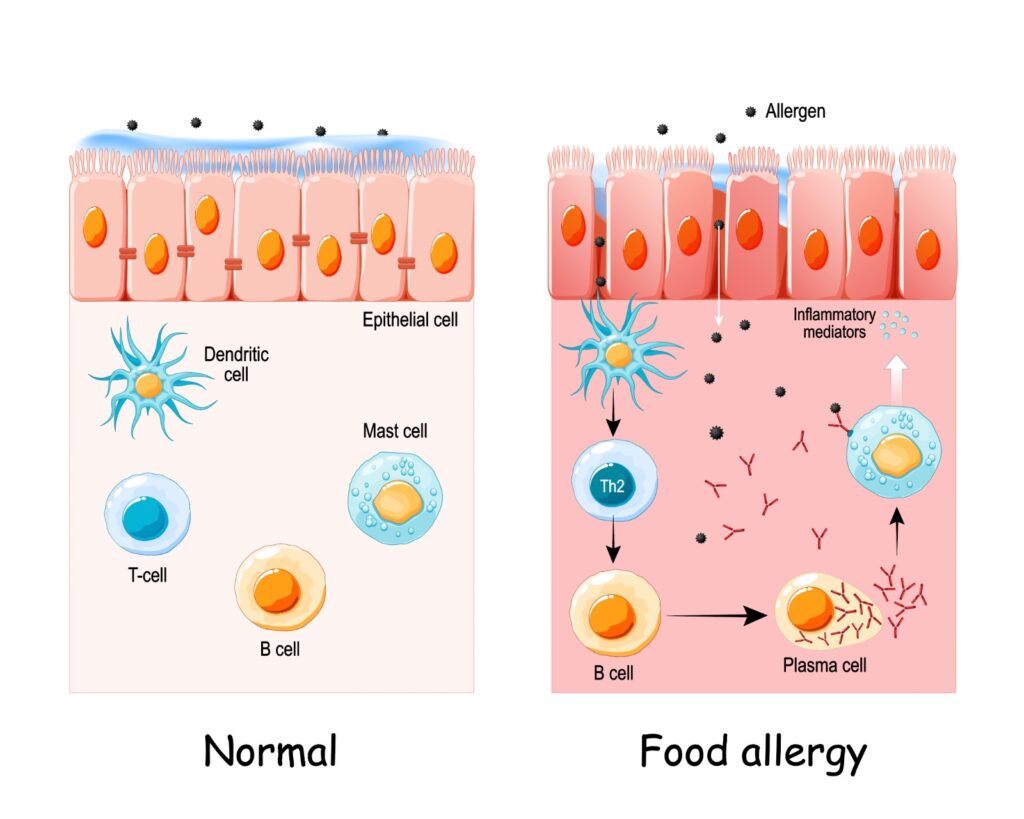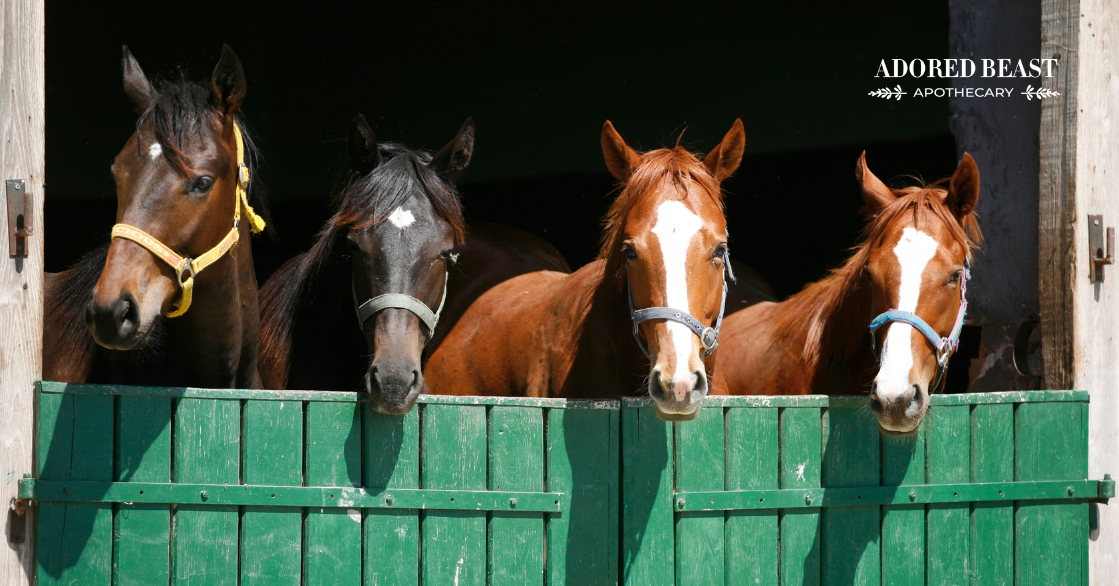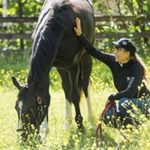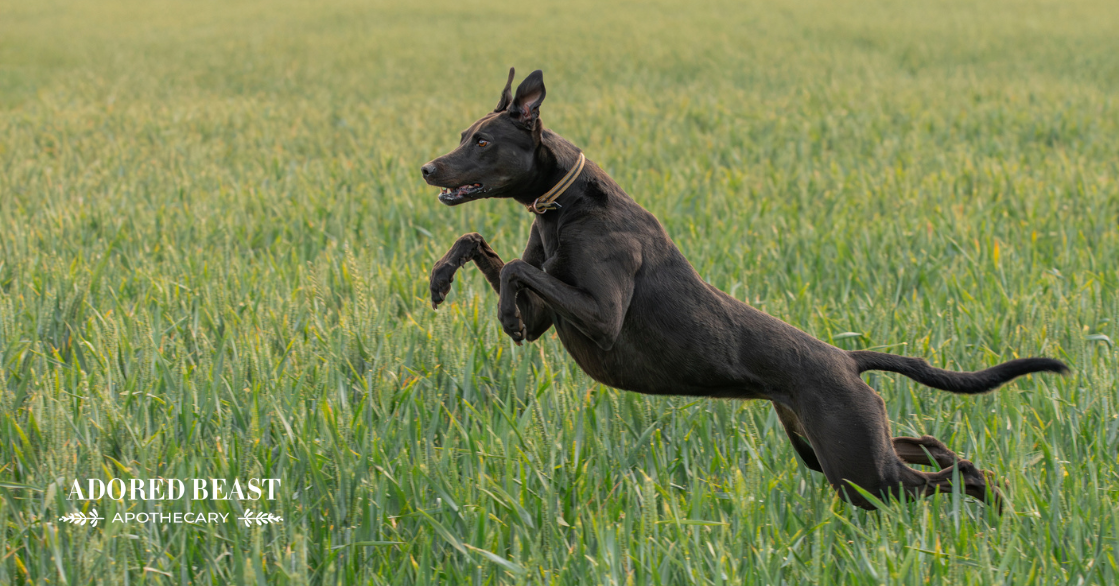Heaves in horses, also known as COPD (chronic obstructive pulmonary disease) or asthma, is a stressful and difficult illness affecting about 12% of domestic horses. Its cause is an allergic reaction of the linings of the airways leading to chronic coughing, nasal discharge, and breathing difficulties.
The most commonly cited cause of this disease is a dusty living environment leading to the development of an allergy. But today we are going to go deeper and look at what happens before the allergy develops and what you can do to prevent and manage heaves with an integrative approach.
How Heaves in Horses Develops
There is a misconception in conventional medicine that allergies are caused by the cells of the immune system creating inappropriate antibodies to passive (non-harmful) allergens in the environment. But it actually goes deeper than that. The immune system becomes dysregulated by other means long before antibodies start to form. An allergy is the aftermath of a long period of time where chronic internal inflammation goes unnoticed and unmanaged. Often times, preventive measures can make a huge difference here. The is especially true if you have a young horse whose immune system is still developing. It is much easier to support and maintain an intelligent immune system than it is to re-educate it.
The linings of the airway (epithelium) are much like the linings of the gut and other mucosal surfaces. These linings are highly changeable, turning over new cells faster than any other tissue in the body (every 1-2 days). This means they can repair quickly if damage occurs. The issue occurs when chronic inflammation causes too much damage for them to fully repair. This is where the issue starts… even before you see symptoms.
The epithelial linings are full of immune-specific cells that have the ability to decipher toxins, allergens, and other environmental particles with great accuracy when they are functioning correctly. Antibodies form as a memory to protect the body from pathogens that can truly affect your horse’s health – mainly bacteria, fungi, and viruses.
But, the more inflammation occurs in the linings, the cloudier this ability becomes. The inflammation causes metabolic and immune dysregulation to the point that immune cells become unable to determine real threats from passive environmental debris. (Normally, the body can clean out this passive debris through the mucous rather than with inflammation and antibody formation.) In other words, the immune system becomes illiterate. Our job is to attempt to re-educate it so that it can regain its previous immune intelligence.

Similar to Leaky Gut?
If there is a chronic inflammatory issue due to excess environmental dust or other respiratory irritation, poor diet, stress, or a combination of these things, it can cause a dysregulation and consequent inflammation. Just like with leaky gut, you can also have leaky airway linings. Often times, if one lining is inflamed, other epithelial surfaces may also be suffering. The link between the gut and the lungs is real! (1)
Typically with COPD, the cells of the airway lining, the mucosal layer, and the typical healthy microbial culture that should be present are inhibited, dysregulated and damaged. So how do we repair this once it starts?
The key is to help the entire system with systemic inflammatory reduction – and I don’t just mean with immune-suppressive drugs. I mean with practical integrative methods that can help you to reduce the amount of drug input your horse needs to have. If your horse needs medication to be comfortable, they should also be receiving support for this. Otherwise, it will be a vicious cycle that continues to become more chronic each year.
Support for Equine Asthma
When it comes to heaves in horses, the name of the game is to support the body for repair. As I mentioned earlier, the linings of the lungs are highly renewable under the right circumstances. Though we are talking about the lungs, we also need to think of the bigger picture and support ALL the epithelial linings of the body. This will help ensure that your horse has the very best chance at symptom reduction. You need to think about supporting:
- The epithelial cells (everywhere in the body)
- The mucosal layer of the lungs (and all other systems)
- The microbiome
This is your best chance at helping the immune system get back to its most intelligent state.
Repair Through Dietary Support
Diet is a great place to start when we talk about repair. Food is something that we have a lot of control over. It also comes into contact with a the large epithelial surface of the gut so you can either promote or reduce inflammatory stress simply but what you are feeding your horse.
Keys to a healthy equine diet:
1. Ditch the Processed Feed
Processed feeds may look “nutritionally balanced” but they often contain low quality ingredients that are high in hidden sugars and chemicals, and they are often not species-appropriate food sources. Rather, they are simply cheap foodstuffs that can cause a huge amount of inflammation in the GI system. Just because it appears to be balanced as far as nutrients does not mean it has been done in a way that is most beneficial to your horse.
2. Eliminate Starch and Sugar
Sugar is a well-known cause of systemic inflammation that can lead to any number of different inflammatory diseases common in horses. This includes asthma. Choose high-fibre, organic/non-GMO food sources with low to zero starch.
3. Eliminate Rancid/Chemical-Laced Oils
If you’re feeding oils of any kind, especially fish oil, you are most likely giving your horse rancid fat that could also be contaminated with harmful solvent residues. If the oils have been heated in any way (even if they have been at room temperature in plastic for long periods of time), they may be having an inflammatory effect rather than an anti-inflammatory one. For omega 3 fats, consider freshly busted flax seed and soaked chia instead of oil.
4. Eliminate Glyphosate – AKA RoundUp
Glyphosate is an herbicide that is commonly and abundantly sprayed on a number of crops that are grown livestock and horses. Wheat, corn, alfalfa, sugar beets, and even flax seed are now being genetically modified to withstand large amounts of glyphosate input. Glyphosate is a patented antibiotic that destroys the microbiome along with being a known endocrine disruptor and cancer-causing agent. If you want to make headway with any inflammatory disease process, you must eliminate this chemical from your horse’s diet. Use only certified organic and non-GMO feed and hay. Always be sure your hay is clean.
[RELATED] For more on avoiding glyphosate, read this post next.
5. Feed Gut-Protective Plants
Yes, a variety of high fibre foods and herbs can help to reduce systemic inflammation! These foods can also help protect the gut if your horse needs medication such as steroids, which are known to cause GI disturbances. Consider the following:
- non-GMO/organic beet pulp fibre (make sure it’s molasses-free)
- slippery elm bark
- marshmallow root
- dandelion leaf and root
- ashwaganda
- astragalus
- medicinal mushrooms – especially cordyceps for respiratory health and turkey tail and chaga for immune health
6. Probiotics
Don’t forget to include a good quality rotation of probiotics, especially for horses who have to take medication and/or have little access to living diet and plants. They need daily microbiome input from healthy sources to increase diversity. Often times with inflammatory immune-mediated diseases, the microbiome is severely compromised and the diversity is low. This includes gut, lung, bladder linings and more.
7. Neutraceuticals
Quercetin with bromelaine – known as the natural form of Benadryl – can work very well for some horses in reducing histamine response.
N-acetyl glucosamine – helps to reduce inflammation and support the repair of all epithelial/mucosal linings in the body. Use non-GMO plant-based sources (not sea-based)
If you want more detail on diet, please check out my equine diet article here.
Other Ways to Support Heaves in Horses
Alongside food, there are several other things you can do to help support heaves in horses.
- Be sure you are cleaning up your horse’s environment. Reduce dust and moulds that could be exacerbating the issue. Turn your horse out or move them to an open area while you are cleaning stalls to reduce dust intake. Do not use a blower or sweep up dust around an asthmatic.
- Stress can worsen inflammatory processes so be sure you’re providing lots of enrichment and comfort for your horse (no matter if they are sick or not). This includes regular movement, grazing and/or regular feedings, and good quality and quantity of bedding for healthy sleep.
- Essential oils can be useful for respiratory disease – work with a certified animal aromatherapist on this front.
- Homeopathic medicine is a safe and effective addition to your asthma-care plan. You can safely give this alongside asthma medications and to support your horse through acute episodes, for chronic disease, and as a supportive measure to counter-act side effects of medication. Work with a certified homeopath to get the best results with chronic diseases such as asthma.
A Note About Asthma Medications
If the asthma is severe, your horse may need periods of steroid intervention to help them breathe. Do keep in mind that these medications have harmful side effects including ulcers, microbiome disturbance, and laminitis. This makes it important to find ways to help reduce the amount of medication your horse has to have through the supportive and non-invasive measures outlined above. It is totally possible to use both conventional and alternative care options for asthma and it can make your horse’s prognosis better.
Quality of life is the most important aspect of managing heaves in horses and I hope this gives you some extra tools to work with in providing that for your beloved animal.
References:












